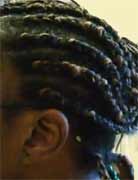- Could Your Grocery Store Meat Be Causing Recurring UTIs?
- Are You Making This Expensive Thermostat Error This Winter?
- Recognizing the Signs of Hypothyroidism
- 10 Strategies to Overcome Insomnia
- Could Artificial Sweeteners Be Aging the Brain Faster?
- Techniques for Soothing Your Nervous System
- Does the Water in Your House Smell Funny? Here’s Why
- Can a Daily Dose of Apple Cider Vinegar Actually Aid Weight Loss?
- 6 Health Beverages That Can Actually Spike Your Blood Sugar
- Treatment Options for Social Anxiety Disorder
Hairdo Trumps Exercise for Many Black Women, Study Finds


Many black women put concerns about their hair above their health, according to new research.
It’s estimated by the U.S. Centers for Disease Control and Prevention that four out of five black women in the United States are overweight or obese. Yet some of them skip physical activity entirely to avoid having to have their hair restyled or restraightened, the University of Colorado School of Medicine study authors said. However, the researchers also noted a shift toward more “low-maintenance” hairstyles, which might help more women overcome these barriers to exercise.
“There is some exciting news from this study,” said co-principal investigator Dr. Amy Huebschmann, director of the university’s Center for Women’s Health Research. “African-American women want to overcome these barriers to exercise, and we studied many African-American women who have already overcome these barriers by adjusting their hairstyles.”
The study involved 51 Denver women ranging from 18 to 75 years old. The women’s health was assessed, and interviewers asked about any hairstyle-related barriers to exercise they faced. They also identified any factors that motivated the women to be active.
The researchers divided the group into two categories: “exercisers” and “non-exercisers.” The “exercisers” engaged in at least 60 minutes of physical activity each week. The “non-exercisers” were active for less than 60 minutes. Both groups had similar rates of diabetes, prediabetes and arthritis.
Although lack of self-discipline or money were reported as barriers to exercise, issues with hairstyle maintenance was the most frequently reported obstacle to physical activity.
Hairstyle concerns were the reason why 29 percent of black women did not exercise regularly. In contrast, only 7 percent of the black women who worked out routinely said their hair was a factor in their decision to exercise.
“We want to find solutions so women in the African-American community can get through these barriers and improve their health,” said the study’s co-principal investigator, Lucille Johnson Campbell, director of special initiatives for the Center for African-American Health in Denver.
To avoid spending an excessive amount of time or money to restyle their hair after a workout, some of the women involved in the study opted for more simple styles that require less upkeep, such as braids and ponytails.
Other chose to engage in “safe” activities that would not make them sweat to avoid messing up their hair.
“We had some women describe concerns of getting fired if they came to work with a low-maintenance hairstyle such as braids or natural hair, but we also heard women saying that they feel there is a growing cultural acceptance of these types of low-maintenance hairstyles,” said Huebschmann in a university news release.
The study’s findings were presented recently at the annual meetings of the Society of Behavioral Medicine and the Society of General Internal Medicine. Data and conclusions presented at meetings are typically considered preliminary until published in a peer-reviewed medical journal.
More information
The U.S. Department of Health Office of Minority Health provides more information on black women and obesity.
Source: HealthDay
Copyright © 2026 HealthDay. All rights reserved.










